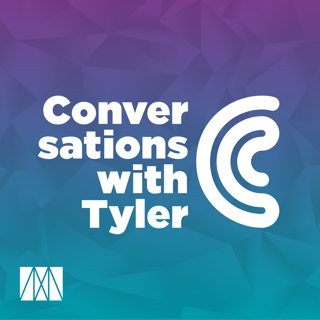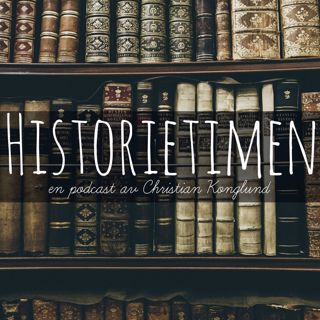
Ray Dalio on Investing, Management, and the Changing World Order
Want to support the show? Visit donate.mercatus.org/podcasts When Ray Dalio was 23, President Nixon announced that the United States would no longer be adhering to the gold standard for American currency. Clerking on the floor of the New York Stock Exchange, Dalio expected to see chaos—but instead stocks soared. Curious to understand this phenomenon, he began to read about similar events in 1933, and it opened his eyes to the lessons that could be drawn from history. His latest book draws on the patterns he's gleaned from studying dynasties and empires throughout time, as well as his own experiences as a hedge fund manager and founder of Bridgewater Associates. Ray joined Tyler to discuss the forces that will affect American life in the coming decades, why we should be skeptical of the saliency of current equities prices, the market as a poker game, the benefits and risks of the US dollar as the world reserve currency, why he thinks US inflation will not be transitory, the key to his success as an investor, how studying the Great Depression enabled him to anticipate the 2008 financial crisis, Bridgewater's culture of radical transparency, the usefulness of psychometric profiles, where the United States is falling short most in terms of moral character, his truth-seeking process, the kinds of education crucial to building a successful dynasty or empire—and what causes them to fail, how transcendental meditation helps him be creative and objective, what he loves about jazz music, what we undervalue about the ocean, why he loves bow-hunting Cape Buffalo, and more. Read a full transcript enhanced with helpful links, or watch the full video. Recorded November 5th, 2021 Other ways to connect Follow us on Twitter and Instagram Follow Tyler on Twitter Follow Ray on Twitter Email us: cowenconvos@mercatus.gmu.edu Subscribe at our newsletter page to have the latest Conversations with Tyler news sent straight to your inbox.
15 Des 202158min

Ruth Scurr on the Art of Biography
The most challenging part of being a biographer for Ruth Scurr is finding the best form to tell a life. "You can't go in there with a workmanlike attitude saying, 'I'm going to do cradle to grave.' You've got to somehow connect and resonate with the life, and then things will develop from that." Known for her innovative literary portraits of Robespierre and John Aubrey, Scurr's latest book follows Napoleon's life through his engagement with the natural world. This approach broadens the usual cast of characters included in Napoleon's life story, providing new perspectives with which to understand him. Ruth joined Tyler to discuss why she considers Danton the hero of the French Revolution, why the Jacobins were so male-obsessed, the wit behind Condorcet's idea of a mechanical king, the influence of Adam Smith's Theory of Moral Sentiments during and after the Reign of Terror, why 18th-century French thinkers were obsessed with finding forms of government that would fit with emerging market forces, whether Hayek's critique of French Enlightenment theorists is correct, the relationship between the French Revolution and today's woke culture, the truth about Napoleon's diplomatic skills, the poor prospects for pitching biographies to publishers, why Montesquieu's Spirit of the Laws would be her desert island read, why Cambridge is a better city than Oxford, why the Times Literary Supplement remains important today, what she loves about Elena Ferrante's writing, how she stays open as a biographer, and more. Read a full transcript enhanced with helpful links. Recorded July 12th, 2021 Other ways to connect Follow us on Twitter and Instagram Follow Tyler on Twitter Follow Ruth on Twitter Email us: cowenconvos@mercatus.gmu.edu Subscribe at our newsletter page to have the latest Conversations with Tyler news sent straight to your inbox. Thumbnail photo credit: Dan White
1 Des 202151min

David Rubenstein on Private Equity, Public Art, and Philanthropy
Baltimore native David Rubenstein is a founding figure in private equity, a prolific philanthropist, and author. From leveraged buyouts to his patriotic philanthropy to his leadership roles within institutions like the Smithsonian, Kennedy Center, and the National Gallery of Art, David has spent much of his life evaluating what makes institutions—and people—succeed. He joined Tyler to discuss what makes someone good at private equity, why 20 percent performance fees have withstood the test of time, why he passed on a young Mark Zuckerberg, why SPACs probably won't transform the IPO process, gambling on cryptocurrency, whether the Brooklyn Nets are overrated, what Wall Street and Washington get wrong about each other, why he wasn't a good lawyer, why the rise of China is the greatest threat to American prosperity, how he would invest in Baltimore, his advice to aging philanthropists, the four standards he uses to evaluate requests for money, why we still need art museums, the unusual habit he and Tyler share, why even now he wants more money, why he's not worried about an imbalance of ideologies on college campuses, how he prepares to interview someone, what appealed to him about owning the Magna Carta, the change he'd make to the US Constitution, why you shouldn't obsess about finding a mentor, and more. Read a full transcript enhanced with helpful links, or watch the full video. Recorded September 30th, 2021 Other ways to connect Follow us on Twitter and Instagram Follow Tyler on Twitter Follow David on Twitter Email us: cowenconvos@mercatus.gmu.edu Subscribe at our newsletter page to have the latest Conversations with Tyler news sent straight to your inbox.
17 Nov 202156min

David Salle on the Experience of Art
When the audience for visual art expanded from small circles of artists and collectors into broader culture, the way art was experienced shifted from aesthetics to explanation. Art, it became thought, should be about something. But David Salle rebukes this literal-mindedness: according to him, what we think and feel when reacting to a piece of art is more authoritative than what's written on the label next to it. A painter, sculptor, and filmmaker, David is also the author of How to See: Looking, Talking, and Thinking about Art, a highly regarded book on artistic criticism. David joined Tyler to discuss the fifteen (or so) functions of good art, why it's easier to write about money than art, what's gone wrong with art criticism today, how to cultivate good taste, the reasons museum curators tend to be risk-averse, the effect of modern artistic training on contemporary art, the evolution of Cézanne, how the centrality of photography is changing fine art, what makes some artists' retrospectives more compelling than others, the physical challenges of painting on a large scale, how artists view museums differently, how a painting goes wrong, where his paintings end up, what great collectors have in common, how artists collect art differently, why Frank O'Hara was so important to Alex Katz and himself, what he loves about the films of Preston Sturges, why The Sopranos is a model of artistic expression, how we should change intellectual property law for artists, the disappointing puritanism of the avant-garde, and more. Read a full transcript enhanced with helpful links, or watch the full video. Recorded August 18th, 2021 Other ways to connect Follow us on Twitter and Instagram Follow Tyler on Twitter Follow David on Twitter Email us: cowenconvos@mercatus.gmu.edu Subscribe at our newsletter page to have the latest Conversations with Tyler news sent straight to your inbox.
3 Nov 202146min

Stanley McChrystal on the Military, Leadership, and Risk
Stan McChrystal has spent a long career considering questions of risk, leadership, and the role of America's military, having risen through the Army's ranks ultimately to take command of all US and NATO forces in Afghanistan, a force representing 150,000 troops from 45 countries. Retiring as a four-star general in 2010, he has gone on to lecture at Yale and launched the McChrystal Group, where he taps that experience to help organizations build stronger teams and devise winning strategies. His latest book, which he tells Tyler will be his last, is called Risk: A User's Guide. He joined Tyler to discuss whether we've gotten better or worse at analyzing risk, the dangerous urge among policymakers to oversimplify the past, why being a good military commander is about more than winning battlefield victories, why we're underestimating the risk that China will invade Taiwan, how to maintain a long view of history, what set Henry Kissinger apart, the usefulness of war games, how well we understand China and Russia, why there haven't been any major attacks on US soil since 9/11, the danger of a "soldier class" in America, his take on wokeness and the military, what's needed to have women as truly senior commanders in the armed forces, why officers with bad experiences should still be considered for promotion, how to address extremists in the military, why he supports a draft, the most interesting class he took at West Point, how to care for disabled veterans, his advice to enlisted soldiers on writing a will, the most emotionally difficult part and greatest joys of his military career, the prospect of drone assassinations, what he eats for his only meal of the day, why he's done writing books, and more. Read a full transcript enhanced with helpful links, or watch the full video. Recorded October 6th, 2021 Other ways to connect Follow us on Twitter and Instagram Follow Tyler on Twitter Follow Stanley on Twitter Email us: cowenconvos@mercatus.gmu.edu Subscribe at our newsletter page to have the latest Conversations with Tyler news sent straight to your inbox. Thumbnail photo credit: Leading Authorities, Inc.
20 Okt 202153min

Claudia Goldin on the Economics of Inequality
Harvard professor Claudia Goldin has made a name for herself tackling difficult questions. What was the full economic cost of the American Civil War? Does education increase or lessen income inequality? What causes the gender pay gap—and how do you even measure it? Her approach, which often involves the unearthing of new historical data, has yielded lasting insights in several distinct areas of economics. Claudia joined Tyler to discuss the rise of female billionaires in China, why the US gender earnings gap expanded in recent years, what's behind falling marriage rates for those without a college degree, why the wage gap flips for Black women versus Black men, theoretical approaches for modeling intersectionality, gender ratios in economics, why she's skeptical about happiness research, how the New York Times wedding announcement page has evolved, the problems with for-profit education, the value of an Ivy League degree, whether a Coasian solution existed to prevent the Civil War, which Americans were most likely to be anti-immigrant in the 1920s, her forthcoming work on Lanham schools, and more. Read a full transcript enhanced with helpful links. Recorded September 1st, 2021 Other ways to connect Follow us on Twitter and Instagram Follow Tyler on Twitter Follow Claudia on Twitter Email us: cowenconvos@mercatus.gmu.edu Subscribe at our newsletter page to have the latest Conversations with Tyler news sent straight to your inbox. Thumbnail photo credit: BBVA Foundation
6 Okt 202149min

Amia Srinivasan on Utopian Feminism
What is our right to be desired? How are our sexual desires shaped by the society around us? Is consent sufficient for a sexual relationship? In the wake of the #MeToo movement, public debates about sex work, and the rise in popularity of "incel culture", philosopher Amia Srinivasan explores these questions and more in her new book of essays, The Right to Sex: Feminism in the Twenty-First Century. Amia's interests lay in how our internal perspectives and desires are shaped by external forces, and the question of how we might alter those forces to achieve a more just, equitable society. Amia joined Tyler to discuss the importance of context in her vision of feminism, what social conservatives are right about, why she's skeptical about extrapolating from the experience of women in Nordic countries, the feminist critique of the role of consent in sex, whether disabled individuals should be given sex vouchers, how to address falling fertility rates, what women learned about egalitarianism during the pandemic, why progress requires regress, her thoughts on Susan Sontag, the stroke of fate that stopped her from pursuing a law degree, the "profound dialectic" in Walt Whitman's poetry, how Hinduism has shaped her metaphysics, how Bernard Williams and Derek Parfit influenced her, the anarchic strain in her philosophy, why she calls herself a socialist, her next book on genealogy, and more. Read a full transcript enhanced with helpful links. Recorded September 8th, 2021 Other ways to connect Follow us on Twitter and Instagram Follow Tyler on Twitter Follow Amia on Twitter Email us: cowenconvos@mercatus.gmu.edu Subscribe at our newsletter page to have the latest Conversations with Tyler news sent straight to your inbox. Thumbnail photo credit: Nina Subin
22 Sep 20211h 5min

David Cutler and Ed Glaeser on the Health and Wealth of Cities
With remote work becoming more common and cities competing for businesses it's become easier than ever before for educated Americans to relocate, leaving cities more vulnerable than they've ever been. In their new book, Survival of the City: Living and Thriving in an Age of Isolation, economists David Cutler and Ed Glaeser examine the factors that will allow some cities to succeed despite these challenges, while others fail. They joined Tyler for a special joint episode to discuss why healthcare outcomes are so correlated with education, whether the health value of Google is positive or negative, why hospital price transparency is so difficult to achieve, how insurance coding systems reimburse sickness over health improvement, why the U.S. quit smoking before Europe, the best place in America to get sick, the risks that come from over-treatment, the possible upsides of more businesses moving out of cities, whether productivity gains from remote work will remain high, why the older parts of cities always seem to be more beautiful, whether urban schools will ever improve, why we shouldn't view Rio de Janeiro's favelas as a failure, how 19th century fights to deal with contagious diseases became a turning point for governance, Miami's prospects as the next tech hub, what David and Ed disagree on, and more. Read a full transcript enhanced with helpful links, or watch the full video. Recorded August 31st, 2021 Other ways to connect Follow us on Twitter and Instagram Follow Tyler on Twitter Follow David on Twitter Email us: cowenconvos@mercatus.gmu.edu Subscribe at our newsletter page to have the latest Conversations with Tyler news sent straight to your inbox. Thumbnail photo credit: Briana Moore
8 Sep 20211h 19min






















